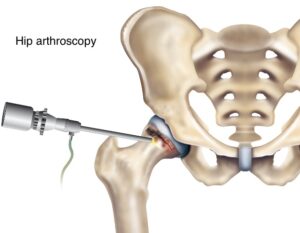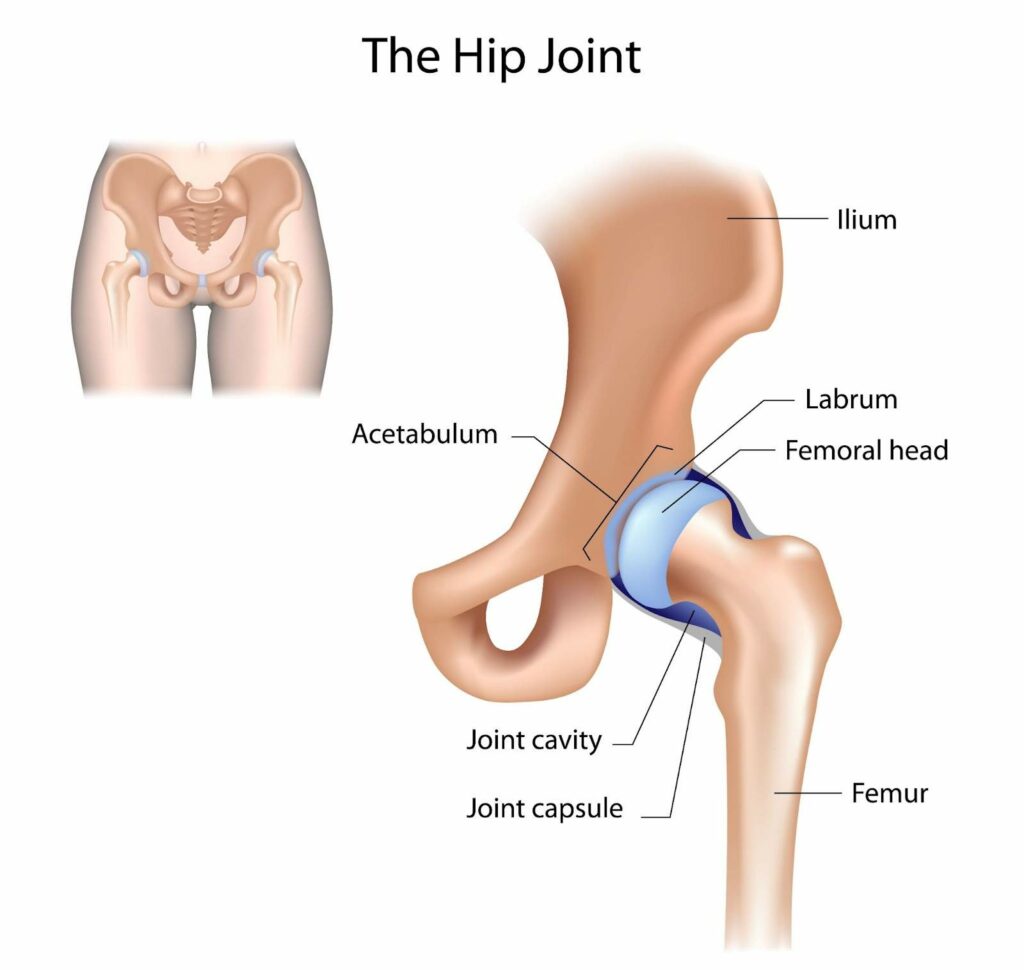If you have been told you need hip arthroscopy, it’s natural to feel a little anxious. This surgical procedure is used to diagnose and treat problems with the hip joint. It can be helpful to know what to expect before your surgery so that you can prepare yourself mentally and emotionally. In this blog post, we will discuss five tips that will help you prepare for hip arthroscopy. We will also talk about what you can expect during and after your surgery.
Contents
What Is Hip Arthroscopy?
 Hip arthroscopy is a minimally invasive surgical procedure that can treat a number of hip problems. The surgery is performed by making small incisions in the hip joint and inserting an arthroscope, which is a thin camera that gives your surgeon a clear view of the inside of the joint.
Hip arthroscopy is a minimally invasive surgical procedure that can treat a number of hip problems. The surgery is performed by making small incisions in the hip joint and inserting an arthroscope, which is a thin camera that gives your surgeon a clear view of the inside of the joint.
This can be used to treat a number of different hip conditions, such as:
- Hip impingement
- Labral tears
- Arthritis
- Loose bodies
It is often believed that hip arthroscopy is a new surgical technique, however, it was actually first performed in the early 1900s. In recent years, there have been significant advancements in surgical techniques and technology, which have made hip arthroscopy a much more common procedure.
How Can You Prepare For Hip Arthroscopy?
As you know about your hip arthroscopy surgery, you will want to start preparing for it. Here are the top 5 tips that you should follow in order to prepare for hip arthroscopy:
Get a Physical Therapy Evaluation
You will want to get a physical therapy evaluation in order to find out which exercises you need to do before surgery. This will help prevent any complications and ensure a smooth surgery. For example, if you have a limited range of motion, your therapist can work on stretching and range of motion exercises with you. An accurate evaluation will also help set realistic post-operative goals.
Follow Your Surgeon’s Orders
Your surgeon will give you specific orders on what you need to do to prepare for hip arthroscopy. It is important that you follow these orders carefully. This is essential because it will help ensure that you have a successful surgery and recovery. In fact, there are always some things or orders that you should never ignore. Because this can impact your safety during and after the surgery.
Some of the general orders or tips that you should follow are:
- Arrange for someone to drive you home after the surgery
- Stop eating and drinking a few hours before the surgery is scheduled
- Wear comfortable, loose-fitting clothes to the hospital
- Remove all jewelry, including body piercings
- Make sure you have a list of all the medications you are taking
Arrive Early
Make sure to arrive at the hospital or surgical center early on the day of your surgery. This will give you time to check in and fill out any necessary paperwork. It will also give you time to ask any last-minute questions that you may have about the surgery. For instance, you may want to ask your surgeon what type of anesthesia they will be using. Or you might want to ask about what you can expect after the surgery is over.
Stop Taking Certain Medications
Certain medications can thin your blood and increase your risk of bleeding during surgery. You will need to stop taking these medications a week or more before your surgery. Some of these medications include:
- Aspirin
- Ibuprofen (Advil, Motrin)
- Naproxen (Aleve)
- Warfarin (Coumadin)
- Clopidogrel (Plavix)
Your surgeon will give you a list of all the medications you need to stop taking before your surgery. Make sure you understand all the instructions before stopping any medications.
Read the surgical rehabilitation protocol
 Finally, your doctor will provide you with a surgical rehabilitation protocol. This will outline the exercises and activities you need to do in order to recover properly. Be sure to follow the protocol closely and don’t try to do too much too soon. For example, you may need to use crutches for assistance or avoid certain activities until the doctor gives you clearance.
Finally, your doctor will provide you with a surgical rehabilitation protocol. This will outline the exercises and activities you need to do in order to recover properly. Be sure to follow the protocol closely and don’t try to do too much too soon. For example, you may need to use crutches for assistance or avoid certain activities until the doctor gives you clearance.
Take your time and make sure you understand each part of the protocol before proceeding. Your therapist can answer any questions you may have about it. Don’t be afraid to ask if something is unclear.
By following these tips you can be prepared for successful hip arthroscopy. Remember to listen to your body and not over-exert yourself. Be sure to discuss any concerns or questions with your doctor before, during, and after the procedure.
What To Expect From The Surgery?
When you are undergoing hip arthroscopy, you may want to know what to expect from the surgery. The surgery itself is generally done on an outpatient basis, which means that you will only need to stay in the hospital for a few hours while it’s being performed.
During the procedure, your doctor will make several small incisions around your hip and insert a slender tube with a light and camera on one end. This will allow your doctor to view the inside of your hip and make any necessary repairs.
You may feel some pressure or pushing around your hip as the surgeon works. It is normal to also experience some discomfort during this time. Your doctor will typically give you local anesthesia, which helps reduce pain and discomfort throughout the arthroscopic procedure.
In short, the process might feel a bit uncomfortable or strange at times, but it should not be overly painful. Once the surgery is complete, your doctor will close any incisions with stitches and you can go home.
How Painful Is Arthroscopic Hip Surgery?
While the procedure itself is generally not painful, you may experience some discomfort during the recovery period. It is important to be aware that you will likely feel some soreness and stiffness in your hip as it heals following the surgery. You can manage this pain by taking prescribed medications and following any instructions given to you by your doctor or physical therapist.
Ice packs can help reduce the swelling and discomfort associated with hip arthroscopy. Applying an ice pack to the affected area for about 20 minutes at a time, several times a day can help reduce inflammation and pain.
It is important to note that physical activity should be limited during recovery from arthroscopic hip surgery. Your doctor will likely advise you to rest for a few days after your surgery and then gradually resume activities like walking. You should also avoid any high-impact activities or strenuous exercises until the area has healed completely.
How Much Time It Will Take To Recovery?
 Recovery time after hip arthroscopy varies from person to person depending on the type and extent of the procedure. Generally, however, most people are able to return to daily activities within one to three weeks. Physical therapy is generally recommended for four to six weeks following surgery.
Recovery time after hip arthroscopy varies from person to person depending on the type and extent of the procedure. Generally, however, most people are able to return to daily activities within one to three weeks. Physical therapy is generally recommended for four to six weeks following surgery.
Depending on recovery progress and individual strength levels, patients may be able to return to light and recreational activities within four to six weeks. High-impact sports, such as running or basketball, may take up to eight weeks before they can be resumed. It is important that physical activity is gradually increased over time under the supervision of a physical therapist in order to ensure proper healing and prevent further injury.
It is also important to take it easy and give the body time to recover. Following the recovery plan can help speed up recovery times. And, of course, it is always important to follow the advice of a medical professional for the best possible outcome.
With appropriate care and attention to recovery, most people are able to return to their normal activities with little or no pain within 8-12 weeks following hip arthroscopy.
Conclusion
In conclusion, it is important to prepare for hip arthroscopy to ensure that the procedure is successful and has a positive outcome. It is important to follow your doctor’s instructions carefully and take any recommended medications or supplements prior to surgery. Additionally, it is important to avoid strenuous activities for up to six weeks following the arthroscopy in order to allow proper healing.
Following these tips can help ensure that you have a successful hip arthroscopy experience. With proper preparation and aftercare, you can be back doing the activities you love in no time!
Physical Therapy has always been proven to help patients recover from pain. Hence, if you’re experiencing Back pain, Shoulder pain, Knee pain, Neck pain, Elbow pain, Hip pain, or Arthritis pain, a physical therapist at MantraCare can help: Book a physiotherapy session.


